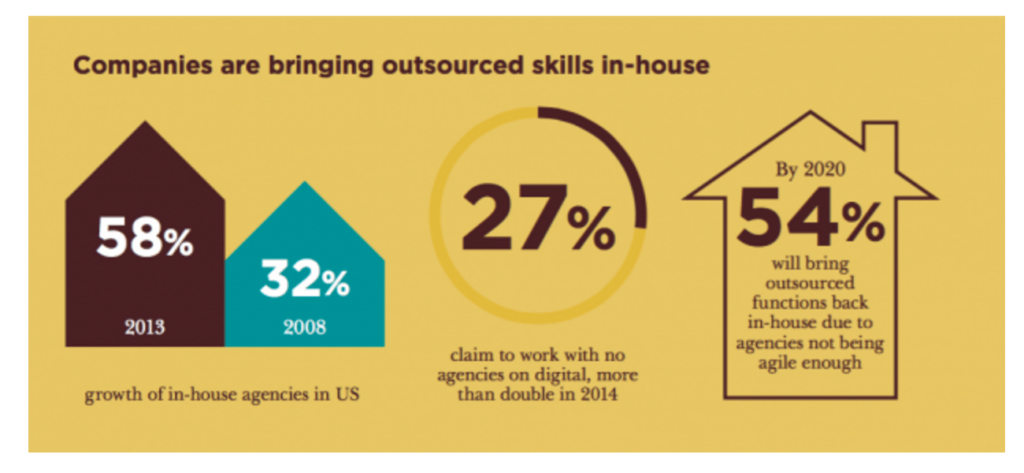Despite the high profile success of companies such as 10up, some agencies are still reluctant to fully commit to WordPress as a solution for clients. The platform’s roots as a blogging engine (and small business CMS) still leave many doubting whether it’s the right technology to build an entire project or team around.
While historical doubts about WordPress in an agency environment were not without justification, the software is more than ready to rise to the challenge these days — and an increasingly impressive number of top-flight agencies have moved large parts of their development efforts over to it.
In this piece, we’ll run through the main reasons why now is an excellent time for agencies to fully embrace WordPress – and why they should put the platform at the center of their future client projects.
Before we get going, though, let’s have a quick word about the changing nature of agencies themselves.
The Agency Model Is Evolving
Oliver Lindberg’s recent piece on the death of the web design agency may have slightly oversold its premise in the title, but it raised a number of important points that modern web development agencies simply can’t ignore. As a robust follow-up debate on Hacker News emphasized, traditional design agencies are under threat from all fronts.
At the lower end of the value chain, the increasing sophistication of solutions such as WordPress and Squarespace provide formerly high-priced functionality at a fraction of the cost. At the top end of the scale, many of the larger corporate clients that agencies have typically relied on are moving projects in-house.

In this type of environment, agencies are having to fight harder than ever to stay afloat and carve out valuable positions for themselves. As Moove Agency’s recent WordCamp London talk highlighted, there’s a real need for agencies of all sizes to stay as nimble and agile as possible. Leveraging the inbuilt advantages of a platform such as WordPress enables them to apportion their resources for individual projects where it really matters.
WordPress Is Proven to Work in an Agency Context
Before we step through some of the more obvious advantages that WordPress brings to the table, it’s worth briefly pointing out the success it’s already had with blue-chip agencies worldwide. There are a number of innovative agencies, such as 10up, Human Made, Alley Interactive, Crowd Favorite, and more who’ve put WordPress at the very heart of their work.
Dig through their respective portfolios, and you’ll see that WordPress is already more than pulling its weight as a technical solution for complex agency projects around the world.
WordPress Fits Snugly Into Modern Development Workflows
Though WordPress has attracted criticism for both the quality of its code and various security issues over the years, the reality today is that it excels on both counts. As one of the highest profile open-source projects in the world, WordPress has benefited from having many eyes on its core code over the last ten years, and the platform’s overall security has never been better. Put it this way: if it’s good enough for NASA and Wired on both counts, it’s probably good enough for your agency.
WordPress also fits snugly into modern development and deployment workflows. The software plays nicely with version control, and as evidenced by projects such as VCCW, is easily integrated into all the latest hotness from the world of DevOps.

When it comes to actually launching projects, the LAMP and LEMP stacks that WordPress traditionally slots into are well understood at this stage, battle-tested, and proven to scale beautifully. If you’re running your own servers, there’s nothing there to give experienced developers or system administrators the heebie-jeebies. Also, you’ve always got the option of running with any one of several excellent specialist WordPress hosting providers that have sprung up over the last five years.
To sum up, from prototyping to eventual build, you’ll find that WordPress enables your development team to iterate effectively, and deliver client solutions quickly.
You’re Not Constantly Reinventing the Wheel With WordPress
Whether you’re considering it in terms of internal wages or billable hours to clients, top-notch design and development talent doesn’t come cheap these days. One of the key advantages of building projects around WordPress is the day-to-day design and development requirements that have already been solved via the plugin and theming markets.
Rather than burning through hours building expensive custom solutions for clients, with WordPress you have an enormous array of modular, off-the-shelf solutions at your fingertips. The size of the overall market also means that leading theme and plugin solutions are professionally developed, commercially viable, and can be relied on over the long haul.
On the back end, you’ll benefit from an admin interface that’s proven itself from a UI point of view across countless sites worldwide, and is relatively simple to customize for clients, should you need to.
As an agency, all of these are huge plus points. You can go into a project with the confidence of knowing you can knock off low hanging fruit with ease, and still have plenty of room for creating custom solutions in a modular manner.
Hiring for WordPress Is Straightforward
Hiring is a crucial consideration for every business – but nowhere more so than in an agency environment, where the quality of your team will be constantly and publicly put to the test.
Whether you’re looking to consolidate your core development team or scale up quickly for one-off projects, there’s an incredibly wide pool of WordPress talent out there capable of working both on-site and remotely. Sites such as Stack Overflow, Toptal, and Codeable make it easier than ever to find the right fit for your team or project.

The underlying language of PHP is popular and stable, the platform itself is tried and trusted, and even developers without extensive previous experience can quickly get up to speed. Put it all together, and you’ve got an environment that’s relatively easy to hire for across the board.
The Next Generation of WordPress Is Built to Integrate With a Wider World
The journey of the REST API has been a somewhat slow and painful one to date, but the implications of its eventual arrival are genuinely huge. The transformation of WordPress into a significantly more powerful application framework is particularly good news for agencies, as it opens the door to much easier integration with existing client systems.
A fully functioning REST API will give agencies the security of knowing they’ve got rock solid functionality that seamlessly integrates into everything – from legacy systems to the latest generation of mobile and wearable apps. The API-driven interfaces highlighted by Matt Mullenweg in his most recent State of the Word address are just the tip of the iceberg here, and we can expect to see much more innovation being unleashed in the near future.
Conclusion
WordPress has emerged as a truly multipurpose framework for projects of all sizes – over the last three years in particular – and has caught the eye of agencies worldwide. As a piece of core technology to base your business around, it’s hard to beat.
Let’s recap the reasons why:
- It has already been battle-tested by innovative agencies, such as 10up and Human Made.
- It fits in beautifully with established modern development workflows.
- It offers a huge range of preexisting modular design and development solutions for you to leverage.
- It’s an easy platform to hire for.
- The flexibility promised by the REST API means it’s a safe, multipurpose bet for the future.
Are you convinced that WordPress is ready for the big time with agencies, or are you still on the fence? Get in touch via the comments section below and share your thoughts!
Featured image: Geralt.

No Comments